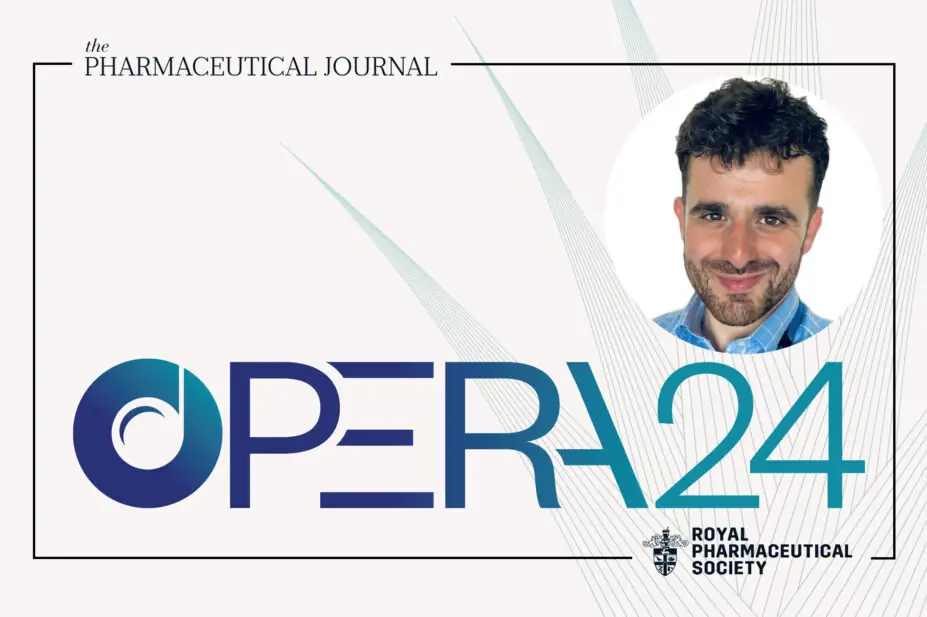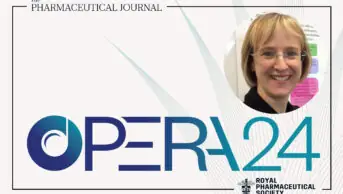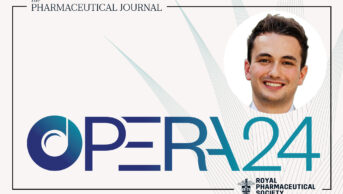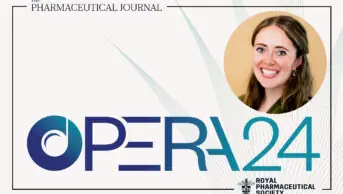
The Pharmaceutical Journal
Ryan McNally often finds that he is the only pharmacist at the table, which was certainly the case when he was the only pharmacist awarded one of five King’s Health Partner Translational Medicine Postdoctoral Clinical Research Excellence Fellowships in March 2024.
After gaining his pharmacy degree at Queen’s University Belfast in 2016, Ryan completed his PhD at King’s College London, where he was awarded a competitive British Heart Foundation (BHF) interdisciplinary studentship. Following completion of his PhD in 2022, Ryan began working as a post-doctoral research associate on a joint project between the Department of Clinical Pharmacology at King’s College London and the Experimental Medicine Unit at the University of Cambridge.
Ryan’s research focuses on personalised medicine approaches for the treatment of hypertension, specifically using established and novel biomarkers to guide antihypertensive treatment. His current focus is a project that aims to investigate the role that salt sensitivity plays in ethnic-related differences in hypertension.
Ryan took an active role in the multicentre AIMHY (Ancestry and biological Informative Markers for stratification of Hypertension) trial, which investigated whether genetic markers of ancestry, combined with blood analysis, can guide hypertension treatment decisions. He was the only pharmacist involved at the largest recruitment site for the trial — St Thomas’ Hospital, London.
Ryan’s research is vital for reducing health inequalities related to hypertension outcomes. “People of black African or black Caribbean origin are disproportionately affected by hypertension,” he explains. “It’s more prevalent, more severe, and more difficult to treat, and current evidence suggests that the first-line drugs, so angiotensin-converting enzyme (ACE) inhibitors and angiotensin receptor blockers (ARBs), are of limited efficacy in black people.”
“There hasn’t been any well-done randomised control trials with good representation of these ethnic minority groups, and you don’t really know what works best in them,” he adds.
As part of this work, Ryan led a collaboration with the University of Abuja Teaching Hospital in Nigeria, investigating the ethnic differences in hypertension phenotypes between African people living in Africa and the UK. Ryan studied more than 300 individuals and his findings have important implications for hypertension pharmacotherapy.
In addition to the impact Ryan’s work has on underrepresented groups affected by hypertension, he is passionate about helping disadvantaged groups access higher education and start their own research journeys. He mentors students as part of the Realising Opportunities Programme, which works to promote fair access and social mobility of students from groups underrepresented in higher education.
Ryan regularly collaborates with colleagues internationally to share expertise. Some of this work comes from connections he made when attending the European Society of Hypertension Conference as one of two nominees from the British and Irish Hypertension Society, which he describes as a “once in a lifetime opportunity”. Ryan was the only pharmacist to attend the conference, where he met nephrologists, internal medicine specialists and hypertension specialists. “We realised that we could incorporate what we do in one area of hypertension and what they do in another area of hypertension,” he explains. One research collaboration that emerged from this opportunity was with a Cochrane statistician from the University of Split in Croatia, which looked at how arterial stiffness can predict future cardiovascular events.
Ryan initially developed an interest in cardiovascular medicine after his father had a heart attack when Ryan was a young child. This led to him reading BHF leaflets and becoming aware of the work that the organisation was doing to prevent cardiovascular diseases.
Ryan’s father unfortunately passed away in 2023, after a second heart attack left him with heart failure. Ryan uses this personal connection to drive his research; he explains that the experience “gave me the push to keep going, and really try and find ways of reducing the burden of hypertension, and make sure that other families maybe don’t have to go through the same thing”.
Panel comments
“Excellent publication record in high quality journals.”
“Excellent and varied engagement activities overseas and in the UK.”
Publications
McNally RJ, Boguslavskyi A, Malek R et al. Influence of blood pressure reduction on pulse wave velocity in primary hypertension: a meta-analysis and comparison with an acute modulation of transmural pressure. Hypertension 2024;81:1619–27. doi: 10.1161/HYPERTENSIONAHA.123.22436
McNally RJ, Farukh B, Chowienczyk P & Faconti L. Effects of potassium supplementation on plasma aldosterone: A systematic review and meta-analysis in humans. J Hypertens 2024. doi: 10.1097/HJH.0000000000003764
Gould A, Ambrosini I, Masci PG et al. “Resistant hypertension, catecholamine excess, left ventricular hypertrophy and systolic dysfunction: hypertensive cardiomyopathy?”. J Hum Hypertens 2023;37(12):1129–30. doi: 10.1038/s41371-023-00852-8
Faconti L, Farukh B, McNally RJ et al. Impaired β2-adrenergic endothelium-dependent vasodilation in patients previously hospitalized with coronavirus disease 2019. J Hypertens 2023;41(6):951–57. doi: 10.1097/HJH.0000000000003420
Li Y, Haseler E, McNally R et al. A meta-analysis of the haemodynamics of primary hypertension in children and adults. J Hypertens 2023;41(2):212–19. doi: 10.1097/HJH.0000000000003326
Brguljan-Hitij J, McNally R, Šinigoj P et al. ESH Summer School 2022: great experience for participants and an important achievement for ESH organization. J Hypertens 2023;41(2):365–68. doi: 10.1097/HJH.0000000000003333
McNally RJ, Farukh B, Chowienczyk P & Faconti L. Sensitivity and Reproducibility of Inferior Vena Cava Diameter and Superior Vena Cava Flow Velocity Measurements to Changes in Cardiac Preload in Subjects with Hypertension. J Cardiovasc Echogr 2022;32(1):6–11. doi: 10.4103/jcecho.jcecho_56_21
McNally RJ, Morselli F, Farukh B, Chowienczyk P & Faconti L. A pilot study to evaluate the erythrocyte glycocalyx sensitivity to sodium as a marker for cellular salt sensitivity in hypertension. J Hum Hypertens 2023;37(4):286–91. doi: 10.1038/s41371-022-00683-z
McNally RJ, Faconti L, Cecelja M et al. Effect of diuretics on plasma renin activity in primary hypertension: A systematic review and meta-analysis. Br J Clin Pharmacol 2021;87(5):2189–198. doi: 10.1111/bcp.14597
McNally RJ, Farukh B, Chowienczyk P & Faconti L. Effect of diuretics on plasma aldosterone and potassium in primary hypertension: A systematic review and meta-analysis. Br J Clin Pharmacol 2022;88(5):1964–77. doi: 10.1111/bcp.15156
Marcon D, Faconti L, Farukh B et al. Does Treatment for Obstructive Sleep Apnoea Improve Arterial Stiffness? Evidence from Randomized Clinical Trials on Carotid-femoral Pulse Wave Velocity. Artery Research 2021;27(1):1–6. doi: 10.2991/artres.k.201102.004
Faconti L, McNally R, Farukh B et al. Differences in hypertension phenotypes between Africans and Europeans role of environment. J Hypertens 2020;38(7):1278–85. doi: 10.1097/HJH.0000000000002403
Faconti L, Parsons I, Farukh B et al. Post-exertional Increase in First-Phase Ejection Fraction in Recreational Marathon Runners. JRSM Cardiovasc Dis 2020. doi: 10.1177/2048004020926366
McNally RJ, Morselli F, Farukh B, Chowienczyk P & Faconti L. A Review of The Prescribing Trend of Thiazide-Type and Thiazide-Like Diuretics in Hypertension: A UK Perspective. Br J Clin Pharmacol 85(12):2707–13. doi: 10.1111/bcp.14109
Faconti L, Farukh B, McNally R, Webb A & Chowienczyk P. Arterial Stiffness Can Be Modulated by Pressure-Independent Mechanisms in Hypertension. J Am Heart Assoc 2019;8(15):e012601. doi: 10.1161/JAHA.119.012601
Faconti L, Farukh B, McNally RJ & Chowienczyk P. Disassociation Of Pulse Wave Velocity With Blood Pressure During Device Guided Breathing. Journal of Hypertension 2019;37:e37-e38. doi: 10.1097/01.hjh.0000570740.66980.41
You may also be interested in

OPERA 2024: Zoe Edwards

OPERA 2024: Sion Scott
